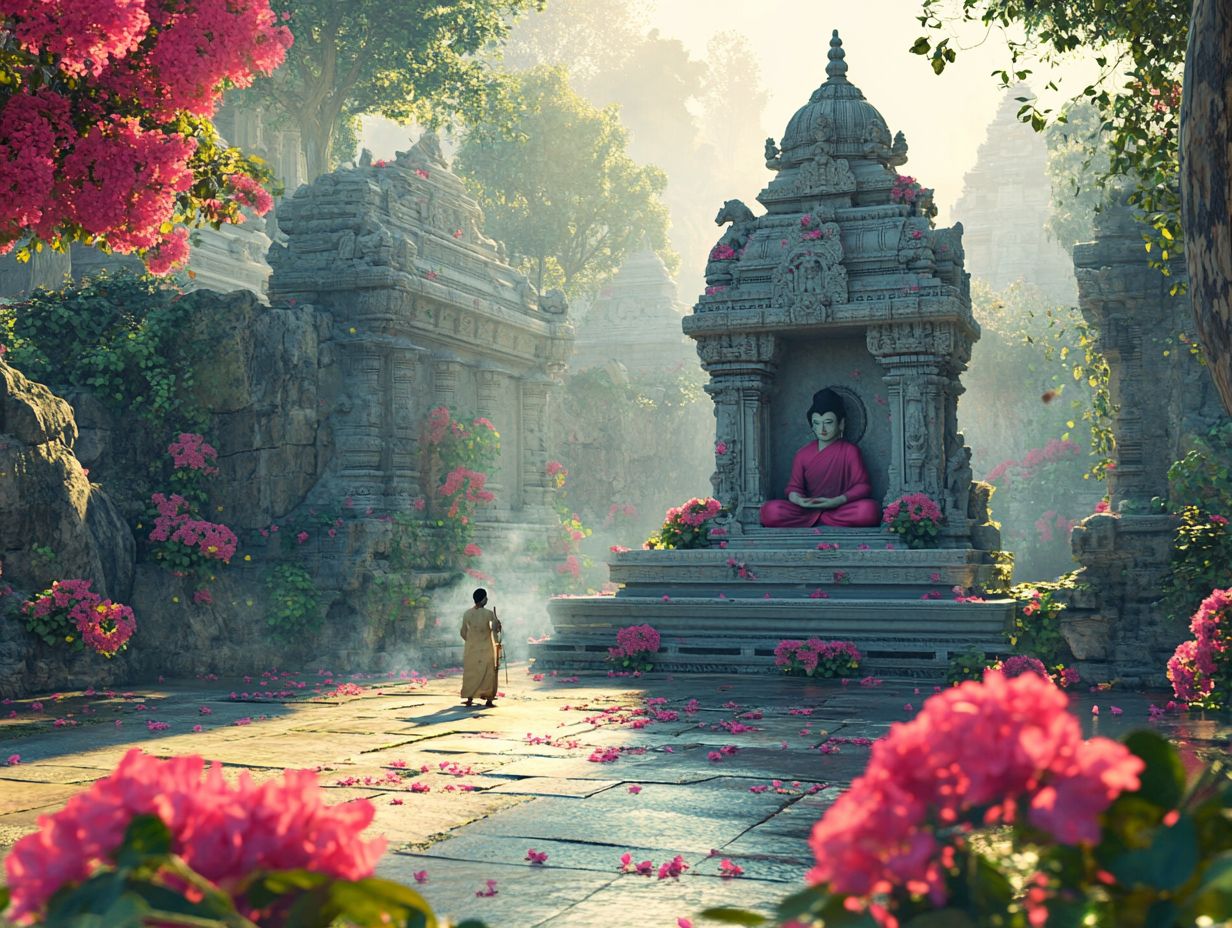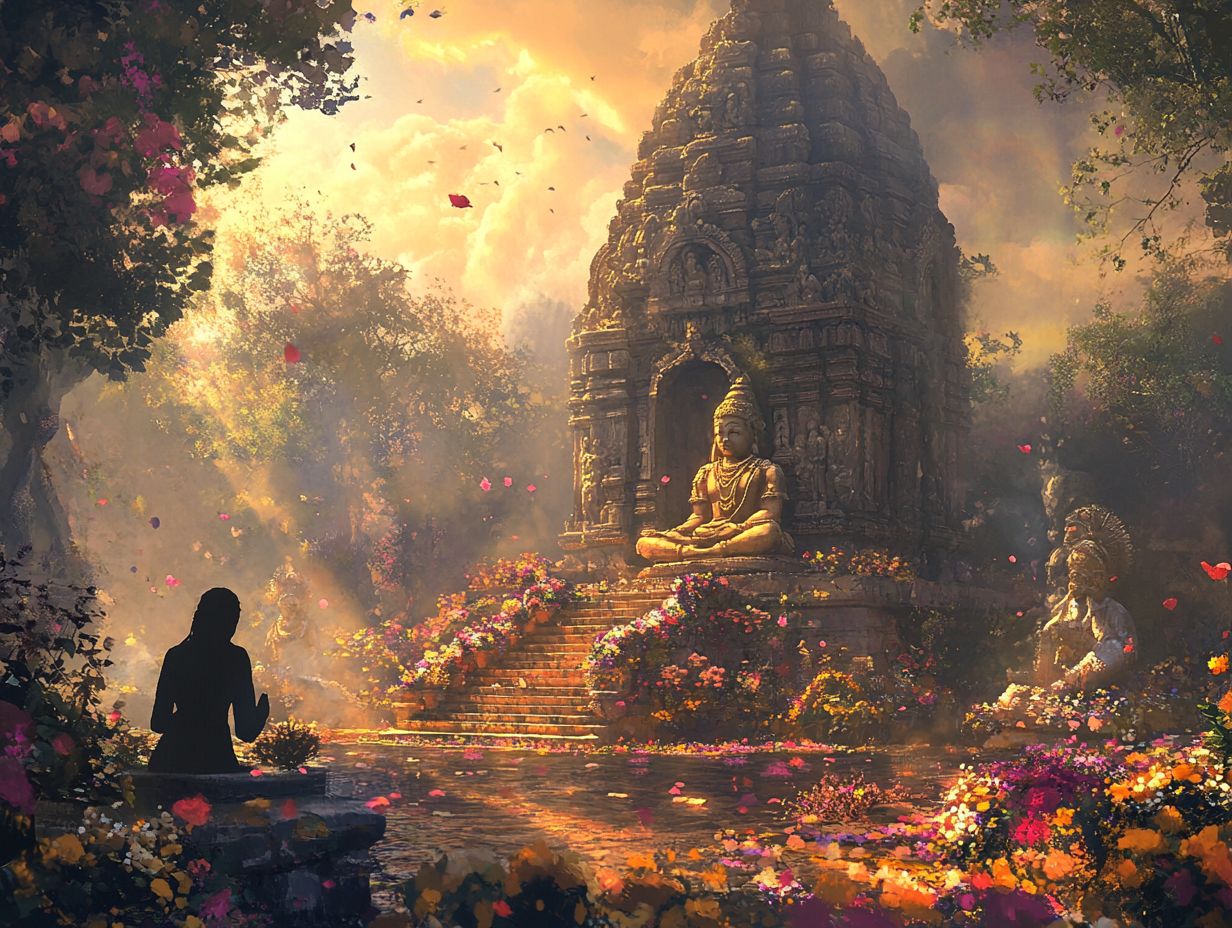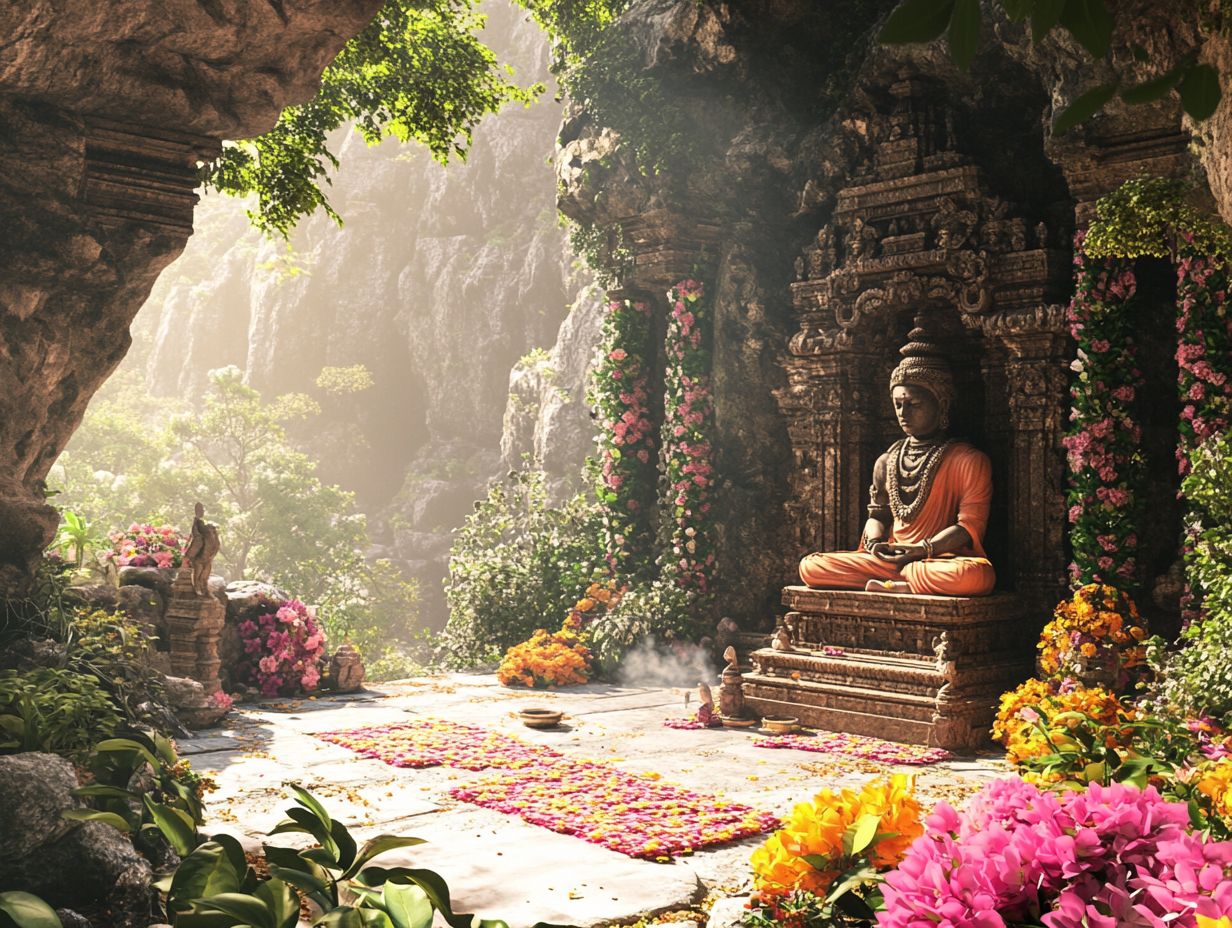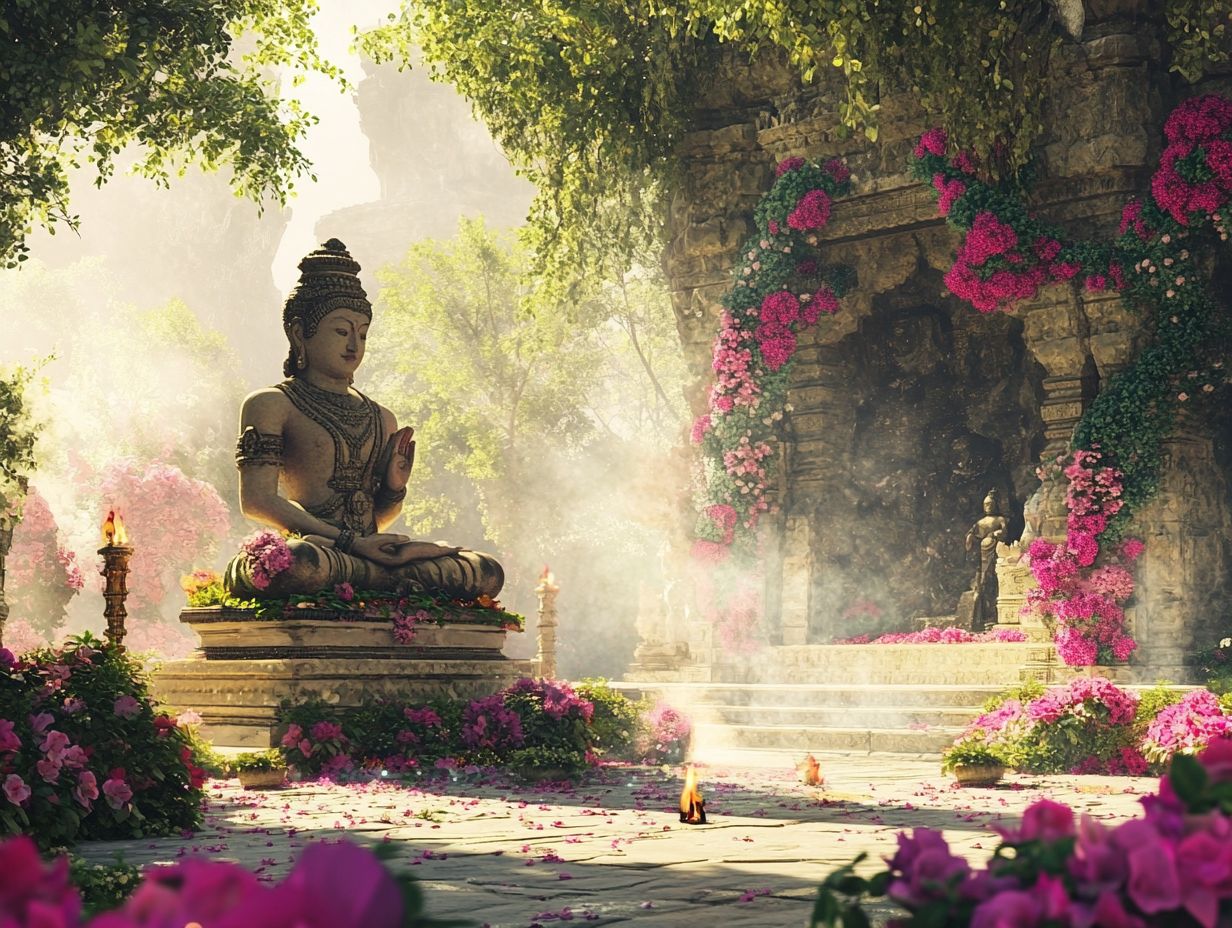What is a Boon in Hinduism?
In Hinduism, the concept of a boon is imbued with profound spiritual and cultural significance, often symbolizing divine favors bestowed upon individuals in response to heartfelt prayers, rituals, and offerings.
This exploration delves into the nuanced distinction between boons and blessings, identifies the entities capable of granting these esteemed spiritual gifts, and discusses the myriad forms they may manifest.
It further examines the rituals associated with the solicitation of boons, their transformative effects on one s life, and their intricate relationship with karma. Through narratives drawn from Hindu mythology and sacred texts such as the Vedas, the article reveals the invaluable lessons that these legendary boons convey, enriching comprehension of their pivotal role in spiritual journeys.
What is the Concept of Boon in Hinduism?

The concept of a boon in Hinduism embodies a profound and auspicious favor granted by deities, encapsulating the essence of divine grace and the blessings bestowed by the gods and goddesses.
Within the intricate tapestry of Hindu beliefs, a boon transcends the realm of mere requests; it serves as a sacred invocation that signifies an individual s connection to the divine and reflects their faith and devotion, often stemming from rigorous spiritual practices and meditation.
Boons are often intertwined with the fulfillment of desires, achieved through spiritual practices, prayers, and rituals, highlighting the significance of dharma, karma, and spiritual growth in the journey toward enlightenment and ultimate salvation.
This concept illuminates the deeper philosophical teachings found in sacred texts such as the Vedas, Upanishads, and Puranas, illustrating how the pursuit of divine favor harmonizes with the cosmic order.
What is the Difference Between Boon and Blessing?
In the realm of Hinduism, the concepts of boon and blessing, while frequently viewed as synonymous, possess distinct meanings that illuminate different facets of divine intervention. A boon is understood as a specific request granted by deities, closely tied to individual desires and spiritual gifts. In contrast, a blessing encompasses a broader benevolence, conferred upon individuals or communities to enhance well-being and foster auspiciousness in life.
For instance, in the epic Mahabharata, the character Ravana receives a boon from Lord Shiva, endowing him with immense strength and invincibility attributes that ultimately contribute to his pride and subsequent downfall, illustrating the complexities of karma phala. Conversely, blessings manifest in rituals such as the Homa or Havan, wherein participants seek divine favor and prosperity not solely for their own benefit but for the welfare of the community at large.
This nurturing aspect of blessings cultivates harmony and collective fortune, underscoring the essential roles that both boons and blessings play in enriching the spiritual journey of individuals. These forces give the power to individuals to navigate the complexities of life with grace and purpose.
Who Can Grant Boons in Hinduism?
In Hinduism, the act of granting boons is regarded as a sacred practice typically conducted by various deities, each believed to possess divine favor and the unique ability to fulfill the desires of their devotees.
Among the revered pantheon of Hindu gods, figures such as Shiva, Vishnu, and Durga stand out for their exceptional capacity to bestow blessings, contingent upon the faith and devotion exhibited by their followers.
Furthermore, spiritual leaders and gurus are often perceived as vital intermediaries, capable of invoking divine intervention. Through specific rituals and prayers, they bridge the divide between the mortal realm and the divine, facilitating the sacred process of boon-granting.
What are the Different Forms of Boons in Hinduism?
The various forms of boons in Hinduism illustrate the diverse avenues through which devotees seek divine favor and auspiciousness in their lives. These boons can take the shape of specific requests for material wealth, health, success, or spiritual growth, underscoring the intricate relationship between human desires and divine will. Each type of boon is often linked to particular rituals, prayers, and auspicious symbols designed to enhance the likelihood of fulfillment while signifying the devotee’s intentions.
For example, the practice of performing homa, or fire rituals, is thought to invoke potent energies that resonate with one’s aspirations, facilitating a deeper connection to the divine. Similarly, the chanting of specific mantras during puja ceremonies calls upon particular deities associated with boons. The clarity of intent behind each request is paramount, as it shapes the nature of the energies summoned, aligning with the principles of karma yoga and bhakti yoga.
Furthermore, offerings made during festivals and auspicious rituals serve as expressions of gratitude, reinforcing the bond with the divine and solidifying the belief that the boons received are vital sources of both spiritual and material nourishment.
How are Boons Requested and Received in Hinduism?
In Hinduism, the intricate process of requesting and receiving boons is steeped in a rich tapestry of rituals, prayers, and devotion, all aimed at forging a profound connection with the divine and aligning with the universal order.
Devotees immerse themselves in specific sacred practices, which often include offerings, mantras, and invocations directed toward various deities, articulating their desires and intentions with heartfelt sincerity. This process not only signifies their faith but also aligns their actions with the cosmic law.
This spiritual tradition underscores the significance of inner faith and the cultivation of virtues such as devotion, ethical living, and communal worship, all of which are believed to draw forth divine grace and foster positive outcomes in their lives, leading to spiritual upliftment.
What are the Rituals and Prayers Involved in Requesting Boons?

The rituals and prayers associated with seeking boons in Hinduism are intricately woven into the fabric of the faith, exhibiting significant variation based on the deity and the nature of the desired boon. These sacred practices often encompass elaborate ceremonies, the chanting of mantras, and the offering of food, flowers, and other symbolic items, all aimed at invoking divine favor. This creates an atmosphere of devotion and sincerity, which is believed to enhance the likelihood of receiving blessings and fostering spiritual well-being.
Each ritual is meticulously designed to resonate with the specific attributes of the deity being worshipped. For example, devotees may recite the Gayatri Mantra while seeking wisdom from Saraswati, the goddess of knowledge and arts, or perform a havan to invoke prosperity through the blessings of Lakshmi. These rituals often include sacred ceremonies that amplify the spiritual connection.
The timing and intention behind these rituals hold paramount importance; auspicious days and personalized prayers significantly amplify the spiritual connection. This devotion reflects a profound belief in the power of divine intervention, deeply embedded within the cultural framework of Hindu traditions and spiritual communities.
What are the Conditions for Receiving a Boon?
In Hinduism, receiving a boon is often contingent upon various conditions that embody the principles of karma, dharma, and divine law. Devotees are required to exhibit genuine faith, adhere to moral values, and possess a deep understanding of their spiritual journey, as these factors play a significant role in shaping the divine response to their petitions. The alignment of one’s intentions with ethical living and the cosmic order is paramount in determining whether a boon will be granted, ensuring that the devotee’s actions are in harmony with universal consciousness.
To truly embody these conditions, devotees are encouraged to engage in selfless service, meditate on their purpose, and seek wisdom from sacred texts such as the Upanishads and Puranas. Such practices not only deepen their connection with the divine but also ensure that they act in harmony with the universal law of karma, which governs the consequences of one’s actions.
By cultivating a sincere commitment to dharma, individuals navigate their spiritual paths with greater effectiveness, fostering personal growth and enhancing their understanding of their place in the cosmos. Ultimately, these endeavors not only increase the likelihood of receiving a boon but also enrich their spiritual lives, nurturing a profound relationship with the divine and facilitating spiritual evolution.
What are the Effects of Boons in Hinduism?
The effects of boons in Hinduism reveal themselves in numerous facets of life, profoundly shaping personal experiences, fostering spiritual growth, and steering the overall course of an individual s journey. This process often leads to greater awareness of metaphysical concepts.
When a boon is bestowed, it is thought to initiate a ripple effect, one that can usher in prosperity, fulfill desires, and yield positive outcomes across both material and spiritual domains. This transformative influence highlights the importance of divine grace and the intricate interplay between karma and dharma in determining one s destiny, ultimately guiding believers toward moksha or liberation.
How Do Boons Affect One’s Life?
When boons are bestowed, they can profoundly influence an individual s life, acting as catalysts for spiritual evolution and personal transformation. The blessings that accompany a boon may present themselves in the form of enhanced opportunities, favorable circumstances, or a deeper sense of inner peace, all of which directly impact the devotee’s spiritual journey and connection to the divine, guiding them toward self-realization and inner peace.
These divine favors not only create pathways to prosperity but also foster a sense of fulfillment that transcends mere material gains. Individuals may find themselves enveloped in an abundance of love, joy, and meaningful relationships, allowing them to forge deeper connections with others and with their own higher selves.
Spiritual growth often accelerates as one begins to appreciate the subtler nuances of existence, cultivating a profound gratitude for the blessings received. The transformative power of receiving such boons nurtures resilience, give the power toing individuals to navigate life’s challenges with grace and discernment.
Can Boons be Reversed or Taken Away?
In Hinduism, the question of whether boons can be reversed or rescinded is a nuanced topic deeply entwined with the principles of karma and divine will. Boons are frequently regarded as sacred gifts bestowed by deities; however, deviations from dharma or unethical conduct can lead to spiritual repercussions, potentially resulting in the forfeiture of previously granted blessings. This underscores the necessity for ethical living and sincere devotion.
The intricate relationship between karma and divine favor plays a pivotal role in this dynamic, suggesting that an individual’s past actions directly influence the perpetuation of these blessings. For example, when a person strays from their righteous path or engages in detrimental behaviors, the weight of accumulated negative karma may eclipse the divine favor that was once granted. As a result, spiritual practitioners often engage in self-reflection regarding their intentions and actions, recognizing that understanding this delicate balance is essential for advancement on their spiritual journey.
Consequently, the implications of losing a boon not only highlight the transient nature of such gifts but also serve as a profound reminder to cultivate inner virtues and devotion, ensuring continued favor from the divine.
How Do Boons Relate to Karma in Hinduism?

The relationship between boons and karma in Hinduism is a complex tapestry, intricately woven from the belief that every action and intention reverberates through the cosmic order. When a boon is bestowed, it is frequently perceived as a manifestation of an individual’s past karmic deeds and present spiritual condition.
This perspective underscores the notion that the alignment of one’s desires with dharma plays a crucial role in determining the bestowal of divine favor.
Can Boons Change One’s Karma?
In Hindu philosophy, the inquiry into whether boons can alter one’s karma is a profound exploration of the delicate balance between divine intervention and personal responsibility. While boons may present opportunities for spiritual advancement and positive outcomes, they do not exonerate individuals from the consequences of their past actions. Rather, these divine gifts act as guiding forces, aiding individuals in navigating the complexities inherent in their karmic journeys.
These divine endowments can illuminate paths that were once shrouded in the burdens of previous deeds, fostering a comprehensive transformation that embraces the nuances of one’s karmic experiences. By receiving a boon, individuals may discover newfound strength and insight, prompting a reflective reassessment of past decisions and a deeper comprehension of how their present circumstances can evolve.
This intricate interplay between the reception of divine assistance and engagement with one s karma encourages a profound reflection on personal actions, urging individuals to harmonize their new opportunities with a steadfast commitment to positive behavior. Ultimately, this alignment nurtures a more balanced existence. Such awareness cultivates a deliberate intention to utilize these boons not merely for personal advantage but as a foundational step toward greater spiritual enlightenment.
What is the Role of Boons in One’s Spiritual Journey?
Boons hold a significant place in the spiritual journey, often serving as milestones that signify divine grace and the fulfillment of desires aligned with one’s higher purpose. They offer a sense of direction and motivation, inspiring individuals to seek a deeper understanding and connection with the divine, ultimately guiding them toward spiritual enlightenment and fulfillment.
These blessings are not merely passive gifts; they act as powerful catalysts for transformation, shaping the trajectory of personal development. Each boon received provides valuable insights that prompt reflection and self-discovery, give the power toing individuals to overcome internal barriers and cultivate resilience.
As one navigates the complexities of life, the influence of these boons becomes increasingly evident, frequently leading to profound realizations that enhance spiritual growth. By embracing these gifts, individuals foster a greater appreciation for their unique journeys, recognizing that the lessons learned along the way are as vital as the milestones themselves.
What are Some Famous Boons in Hindu Mythology?
Hindu mythology is rich with captivating tales of renowned boons bestowed upon devotees, each narrative embodying the profound interaction between mortals and deities. These stories not only highlight moral principles and the significance of devotion but also reflect the teachings inherent in the cultural practices of Hinduism.
They illustrate how such boons can result in remarkable outcomes and offer deep spiritual insights, revealing the intricate relationship between the divine and the human experience.
What Lessons Can be Learned from These Stories?
The lessons gleaned from the tales of boons in Hindu mythology are replete with moral values that inspire individuals to nurture virtues such as devotion, perseverance, and ethical living. Each narrative not only underscores the significance of divine gifts but also highlights the importance of aligning one’s desires with dharma and the cosmic order, ultimately guiding individuals toward a more fulfilling spiritual journey.
These ancient stories serve as poignant reminders that the interpretation and application of such boons necessitate wisdom and discernment. In contemporary spiritual practices, individuals are encouraged to reflect on how their aspirations resonate with elevated ethical standards. For example, the quest for material wealth should never eclipse the pursuit of compassion and selflessness key tenets of ethical living.
As a result, the rich symbolism woven into these mythological narratives deepens one’s understanding of the consequences of choices, compelling practitioners to cultivate inner virtues while navigating the complexities of modern existence.
Frequently Asked Questions

What is a Boon in Hinduism?
A boon in Hinduism refers to a desirable or favorable blessing or gift bestowed upon a person by a deity or divine power.
What are the types of Boons in Hinduism?
There are two types of boons in Hinduism – material and spiritual. Material boons refer to wealth, health, and prosperity, while spiritual boons refer to enlightenment and liberation.
How are Boons obtained in Hinduism?
Boons in Hinduism are obtained through devotion, prayers, and performing good deeds. It is believed that a person’s karma plays a major role in receiving a boon from a deity.
Who are the deities associated with granting Boons in Hinduism?
The three main deities associated with granting boons in Hinduism are Brahma, Vishnu, and Shiva. Each deity represents different aspects and qualities and can grant different types of boons.
What is the significance of Boons in Hindu mythology?
Boons play a significant role in Hindu mythology as they are seen as a way for individuals to achieve their desires, overcome obstacles, and attain spiritual growth. The granting of boons by deities is also seen as a sign of their mercy and benevolence towards their devotees.
Are there any cautionary tales associated with Boons in Hinduism?
Yes, there are cautionary tales associated with boons in Hinduism, such as the story of King Ravana who received a boon of invincibility but ultimately met his downfall due to his arrogance and misuse of the boon. These tales serve as a reminder to use boons wisely and with humility.
